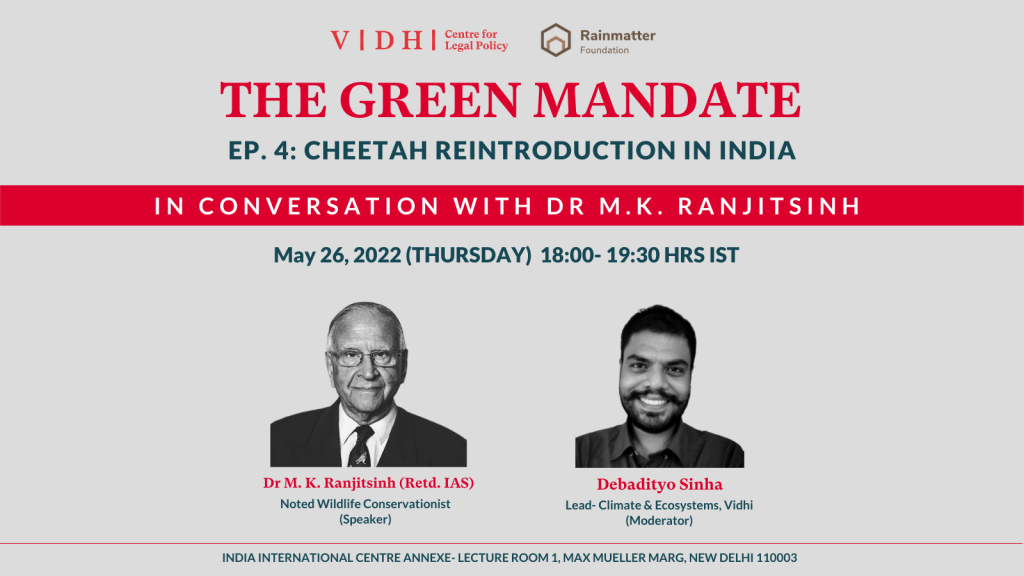May 2022
Green Mandate EP. 4 – ‘Cheetah Reintroduction in India’ in conversation with Dr M.K. Ranjitsinh (Retd IAS).

The Vidhi Centre for Legal Policy and Rainmatter Foundation invite you to the THE GREEN MANDATE EP. 4, on the ‘Cheetah Reintroduction in India’ in conversation with noted wildlife conservationist Dr M.K. Ranjitsinh (Retd IAS). The conversation will take place at India International Centre Annexe, Lecture Room-I (New Delhi) on 26th May 2022, at 6 pm IST.
About the Cheetah Reintroduction Project
The Cheetah was officially declared extinct in India in 1952. Thereafter, in 2009, the ‘African Cheetah Introduction Project in India’ was conceived. However, it is only after a decade of deliberation that further developments have occurred on this front. The Supreme Court set up a three member committee to guide the reintroduction plan and gave its final approval in January 2020. Subsequently, after a delay caused by the COVID-19 pandemic, the ‘Action Plan for Introduction of Cheetah in India’ was released in 2022. It is planned to translocate 50 Cheetah in the next 5 years, with about 10-12 cheetah being brought in from South Africa and Namibia in the first year. On an experimental basis, the first site for reintroduction of the Cheetah will be Kuno Palpur National Park (KNP) in Madhya Pradesh, which after a survey of 10 locations, was considered to be the most suitable habitat and prey base for the holding and conservation breeding of the species.
About Dr M.K. Ranjitsinh
An authority in wildlife conservation in India- Dr Maharaj Kumar Ranjitsinh was born in the royal family of the princely state Wankaner, in Saurashtra (Gujarat). He joined the Indian Administrative Service in 1961 and held important positions at both State and Central levels.
As a collector of Mandla (1967-1970) in Madhya Pradesh, he helped save the central Indian Barasingha (Swamp Deer) from extinction.. In 1971, as Deputy Secretary of Forests and Wildlife in the Ministry of Food and Agriculture, he drafted the Wildlife (Protection) Act, 1972. He was the first Director of Wildlife Preservation in 1973-75 under the newly established Ministry of Environment and Forests. He was reappointed to the same position for a second term between 1985-89.
He was instrumental in the identification of the first tiger reserves in India as the Member Secretary of the Task Force formulating Project Tiger. He also played a key role in launching numerous projects including Project Crocodile, Project Snow Leopard and several other endangered species of India. He is also credited with the amendments to the Wildlife (Protection) Act, 1972 that placed a complete ban on the trade of wildlife species in India.
Dr. Ranjitsinh has also served as Regional Adviser in Nature Conservation (Asian Countries) for the United Nations Environmental Programme in 1975-1980. He continued influencing the wildlife conservation movement in India after his retirement from Government service in 1996. In 1997, he headed a special unit for tiger conservation in India at World Wildlife Fund for Nature- International. He has been associated with major conservation initiatives as a member of the National Board for Wildlife and its Standing Committee; Chairman, Biodiversity Conservation, Madhya Pradesh, 1998; member, National Forest Commission, 2003; Chairman, Wildlife Trust of India, 2008-09. He has been an integral part of several landmark projects including translocation of Asiatic Lions from Gujarat, protection of habitats of Great Indian Bustard and reintroduction of Cheetah in India.
His paper ‘Assessing the Potential for Reintroducing the Cheetah in India’ (2010) became a precursor of the Cheetah Reintroduction project in India. He was also part of the Cheetah Reintroduction Task Force and co-authored the ‘Action Plan for Introduction of Cheetah in India with special emphasis on First Release Site- Kuno National Park’ (2021) for the Government of India.
Dr Ranjitsinh has published more than 50 papers on nature conservation and has written two books- ‘Beyond the Tiger: Portraits of Asian Wildlife’ and ‘A Life with Wildlife: From Princely India to the Present.’ Honouring his unparalleled contribution to protection of Indian wildlife- the eastern subspecies of the Indian Swamp Deer is named after him (Rucervus duvaucelii ranjitsinhi). He was awarded the Sanctuary Lifetime Service Award in 2014.
Schedule
26th May 2022, Thursday, 18.00-19.30 HRS (IST)
India International Centre Annexe, Lecture Room-I, Max Mueller Marg, New Delhi 110003
17.30 hrs: Tea and Snacks
18.00 hrs: Introduction
18.10 hrs: Discussion with Dr Ranjitsinh
18.50 hrs: Q&A Session with Audience
The event is open for all, but prior registration is recommended. You can also send your questions for Dr Ranjitsinh in advance to be considered during the live discussion. Fill the form below to RSVP and send your questions.
About The Green Mandate
The UNEP Global Report on Environmental Rule of Law observed that despite a 38-fold increase in environmental laws worldwide since 1972, the greatest challenge to environmental protection remained partial enforcement and implementation.
India, a megadiverse country with 10 biogeographic zones and 4 biodiversity hotspots, is also the second most populous country in the world. The future of India’s natural heritage depends greatly on how we conserve and manage our natural resources and wildlife today. This not only requires the current laws to be firm, but also for the policy framework to remain dynamic and responsive to the new and emerging challenges.
Further, a nuanced understanding of the implementation challenges at the ground, regularly evaluating the impact of any new amendments to the laws, attending to the neglected aspects of the regulatory framework and contemplating the drivers which influence the law and policy making are some of the critical actions which are required on part of the state as well as the civil society.
THE GREEN MANDATE provides a platform for an in-depth conversation on such issues affecting current conservation challenges and aims at developing a deeper public discourse on the law and policy aspects of it.